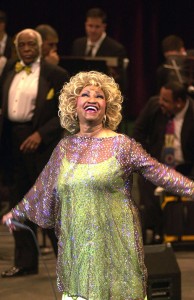Women’s History Month: Celia Cruz

Celia Cruz was born in Cuba and became internationally famous for her powerful voice, her exciting live performances, and her colorful costumes.
Credit: AP/Wide World
March is Women’s History Month, an annual observance of women’s achievements and contributions to society. This month, Behind the Headlines will feature woman pioneers in a variety of areas.
The Queen of Salsa will become the first Afro-Latina to appear on the United States quarter. As part of the American Women Quarters Program, Cuban-born singer Celia Cruz will be smiling back from quarters soon. Cruz is considered the greatest female singer in the salsa style of music.
Salsa is a style of Latin dance music that blends a variety of African and Spanish elements. The term salsa is Spanish for sauce, perhaps referring to the hot, spicy character of the music. Salsa is rooted in Cuban music of the early 1900’s, especially a style call son. Cuban immigrants carried son to the United States. There, it absorbed elements of Puerto Rican music as well as jazz and rock music, especially in the 1960’s and 1970’s. At this time, the resulting musical blend became known as salsa. Salsa music incorporates many different instruments, including bass, piano, trombone, trumpet, and several types of percussion instruments.
Popularly known as la Reina de la Salsa (the Queen of Salsa), Cruz performed for more than 50 years in both Cuba and the United States. Cruz became internationally famous for her powerful voice, her exciting scat singing (singing wordless syllables instead of lyrics), her colorful costumes, and her skill at engaging the audience during her performance. She recorded more than 70 albums.
Cruz was born in Havana, Cuba, on Oct. 21, 1925. Her full name was Ursula Hilaria Celia Caridad Cruz Alfonso. She began singing as a youngster. In 1950, she joined the band La Sonora Matancera, one of the top tropical bands of its day.
In 1960, La Sonora Matancera left Cuba for a job in Mexico. Rather than return to Cuba, which had come under the dictatorship of Fidel Castro the year before, Cruz and the band went to the United States. She became a permanent U.S. resident in the early 1960’s and a U.S. citizen in 1977. Cruz left La Sonora Matancera to begin her career as a soloist in 1965. She recorded albums with such Latin bandleaders as Willie Colon, Ray Barretto, Johnny Pacheco, and Tito Puente. At the end of her career, Cruz was also performing disco and hip hop music. Cruz died on July 16, 2003.


